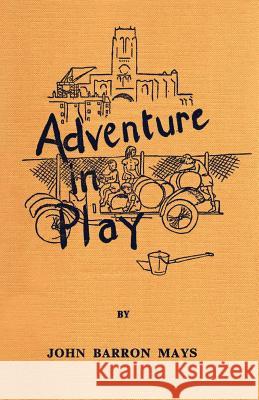Adventure in Play » książka
Adventure in Play
ISBN-13: 9781904792307 / Angielski / Miękka / 2015 / 48 str.
First published in 1957, 'Adventure in Play' is a report on one of the first experimental adventure playgrounds in the UK, funded by the National Playing Fields Association (now 'Fields in Trust'). An original idea of the Danish landscape architect, C.T. SOrenson, adventure playgrounds aimed to provide children with designated space to do what mattered to them, rather than to the adults for whom urban spaces were designed. The adventure playground pioneers saw adventure playgrounds as a potential solution to a fundamental problem in society, described by Mays as "the wide cleavage between youth and age, childhood and maturity." Children and adults were understood to have differing perspectives and different priorities, and for the adventure playground pioneers it was simply a matter of fairness that children were provided with some time and space in which their perspectives and priorities took precedence. Following the model of the first Danish adventure playground in Copenhagen, the UK adventure playground pioneers set about discovering how best to develop these unorthodox spaces for children through trial and error. 'Adventure in Play' details the many trials of setting up and running an adventure playground, several of which will be familiar to adventure playground workers today. Mays also provides a disarmingly honest account of the errors made in the two years of the Rathbone Street experiment, so that others might learn from their mistakes and better serve the distinct needs of children within adult-dominated society. 'Adventure in Play' provides an engaging and sometimes challenging account of one of the first adventure playgrounds, and in doing so raises important questions about the development of adventure playgrounds and the modern-day playwork profession which grew out of them.
First published in 1957, ‘Adventure in Play’ is a report on one of the first experimental adventure playgrounds in the UK, funded by the National Playing Fields Association (now ‘Fields in Trust’). An original idea of the Danish landscape architect, C.T. Sørenson, adventure playgrounds aimed to provide children with designated space to do what mattered to them, rather than to the adults for whom urban spaces were designed. The adventure playground pioneers saw adventure playgrounds as a potential solution to a fundamental problem in society, described by Mays as “the wide cleavage between youth and age, childhood and maturity”. Children and adults were understood to have differing perspectives and different priorities, and for the adventure playground pioneers it was simply a matter of fairness that children were provided with some time and space in which their perspectives and priorities took precedence. Following the model of the first Danish adventure playground in Copenhagen, the UK adventure playground pioneers set about discovering how best to develop these unorthodox spaces for children through trial and error. ‘Adventure in Play’ details the many trials of setting up and running an adventure playground, several of which will be familiar to adventure playground workers today. Mays also provides a disarmingly honest account of the errors made in the two years of the Rathbone Street experiment, so that others might learn from their mistakes and better serve the distinct needs of children within adult-dominated society. ‘Adventure in Play’ provides an engaging and sometimes challenging account of one of the first adventure playgrounds, and in doing so raises important questions about the development of adventure playgrounds and the modern-day playwork profession which grew out of them.











